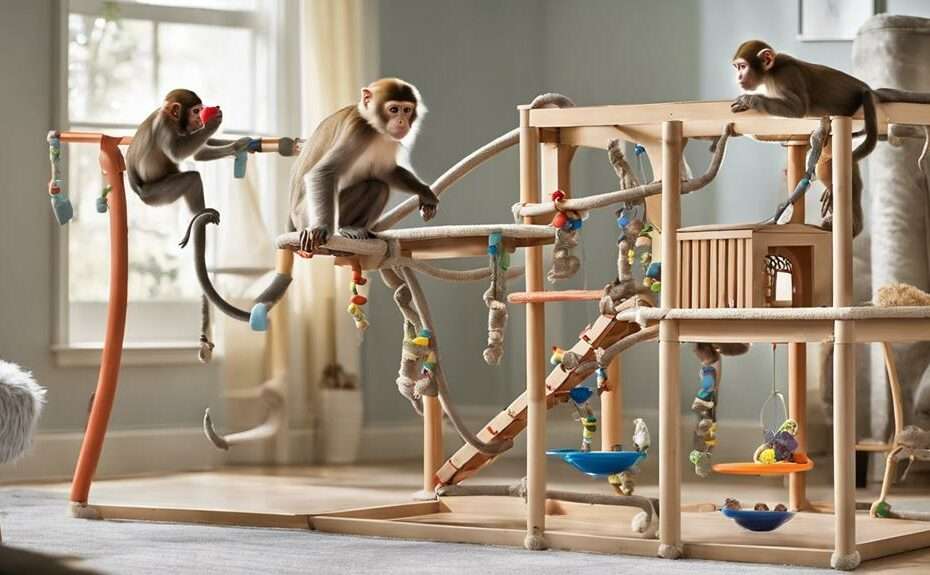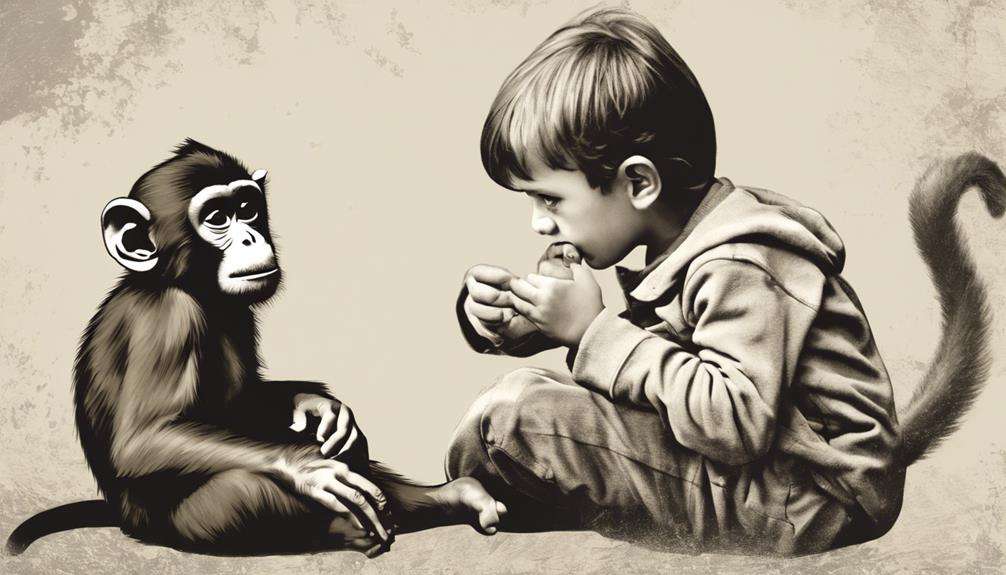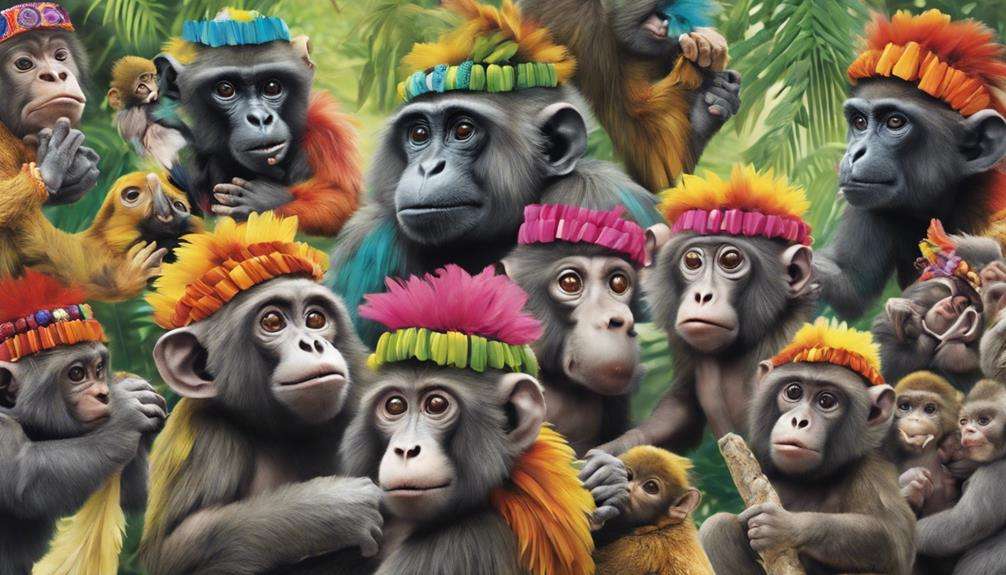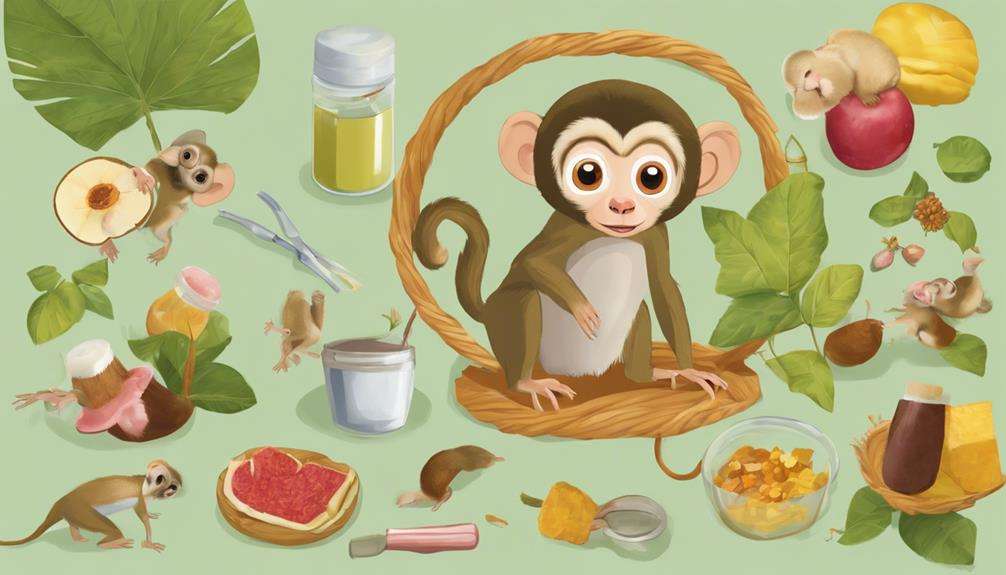If you've ever wondered about the intricate care required for pet monkeys, you're not alone. Understanding the nuances of monkey care involves more than just providing food and shelter.
From selecting the right species to creating a stimulating environment and managing the challenges of ownership, there's a lot to think about.
By exploring the best practices in pet monkey care, you'll uncover essential tips to guarantee the well-being and happiness of these intelligent creatures.
Key Takeaways
- Thorough research on monkey species and their care needs is crucial before choosing a pet.
- Providing a diverse and balanced diet is essential for the health of pet monkeys.
- Enriching the living environment with toys and activities promotes mental stimulation and well-being.
- Regular veterinary check-ups and adherence to legal regulations are vital aspects of responsible pet monkey ownership.
Monkey Species Selection
When considering monkey species for pet ownership, it's vital to thoroughly research and understand the specific care needs and behaviors of each species before making a decision. Among the various types of monkeys that are commonly kept as pets, capuchin monkeys are a popular choice due to their small size, intelligence, and ability to form strong bonds with their human caregivers. Capuchins are known for their mischievous and playful nature, requiring ample mental stimulation and social interaction to thrive in a domestic setting. These pet monkeys have a lifespan of around 40 years, emphasizing the long-term commitment involved in caring for them.
While capuchin monkeys can be affectionate and entertaining companions, they also have specific dietary and housing requirements that must be met to ensure their well-being. Before bringing a capuchin monkey into your home, it's essential to consider your lifestyle, living situation, and ability to provide for the physical and emotional needs of these intelligent primates. Researching the different monkey species available and their characteristics will help you make an informed decision that aligns with your capabilities as a responsible pet owner.
Suitable Diet and Nutrition
To guarantee the prime health and well-being of your pet monkey, it's essential to provide a varied diet that includes fruits, vegetables, and protein sources for balanced nutrition. Monkeys should have a diet that consists of a mix of fruits like bananas, apples, and berries, as well as vegetables such as leafy greens, carrots, and bell peppers. Protein sources like insects and small amounts of lean meat can be included to make sure they meet their dietary needs.
It's vital to avoid feeding monkeys toxic foods, as these can be harmful to their health. Consulting a vet for a specialized diet plan is recommended to tailor the nutrition to your specific monkey's needs. By providing a diverse range of foods, you can help meet your monkey's nutritional requirements and support their overall health. Remember, a well-rounded diet is key to keeping your pet monkey healthy and thriving.
Enclosure Setup and Maintenance
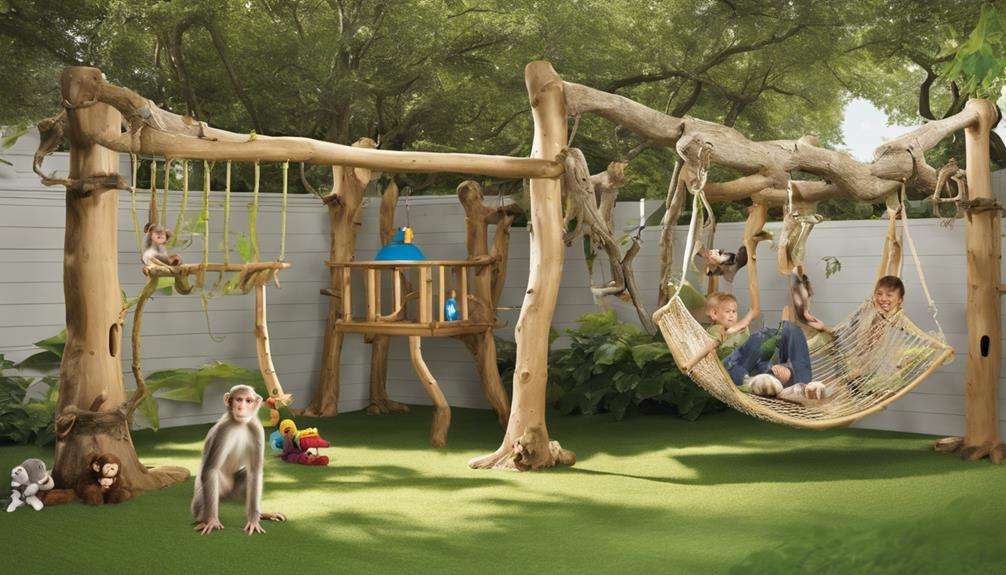
When setting up the enclosure for your pet monkey, make sure it's spacious with climbing structures, toys, and hiding spots for physical and mental stimulation.
Regularly clean and sanitize the cage to maintain a hygienic living environment, and monitor for wear and tear, making repairs or replacements as needed to guarantee safety.
Remember to secure the cage with locks on entryways to prevent accidents and escapes.
Safe Enclosure Design
How can you guarantee the safety and well-being of your pet monkey through its enclosure design and maintenance?
To make sure your monkey's comfort, provide a spacious enclosure, at least 4×4 feet and 6 feet high, with larger monkeys needing more space. Include climbing structures and toys for physical exercise and mental stimulation. Hiding spots offer privacy and security. Make sure the enclosure is escape-proof and safe to prevent accidents.
Regular maintenance is important for a healthy and comfortable living space for your pet monkey. By incorporating these elements into the design and consistently maintaining the enclosure, you can create a safe and enriching environment for your monkey to thrive in.
Regular Cleaning Routine
For perfect hygiene and maintenance of your pet monkey's enclosure, establish a daily cleaning routine to remove waste and uphold cleanliness standards.
Clean the enclosure daily to eliminate waste and maintain hygiene levels. It's important to use pet-safe cleaning products to sanitize the cage and toys regularly.
Additionally, replace bedding frequently to prevent odors and inhibit bacterial growth. Disinfect food and water dishes on a daily basis to prevent contamination and guarantee your pet's health.
Keep a close eye on the enclosure for any signs of wear and tear, promptly repairing or replacing damaged parts to maintain a safe environment for your pet monkey.
Regular cleaning is essential for the well-being of your pet and the longevity of the enclosure.
Enrichment and Mental Stimulation
To guarantee prime mental well-being for your pet monkey, regularly provide a diverse range of toys, puzzles, and activities that promote cognitive engagement and prevent boredom. Monkeys, like humans, thrive on mental stimulation.
Rotating enrichment items regularly will keep your monkey engaged and interested in their environment. Encourage natural behaviors such as foraging and climbing to keep them mentally stimulated.
Interactive games and training sessions not only provide mental challenges but also strengthen the bond between you and your monkey. Monitor your monkey's behavior for signs of boredom or stress, and adjust enrichment activities accordingly to promote their mental well-being.
Health Monitoring and Veterinary Care
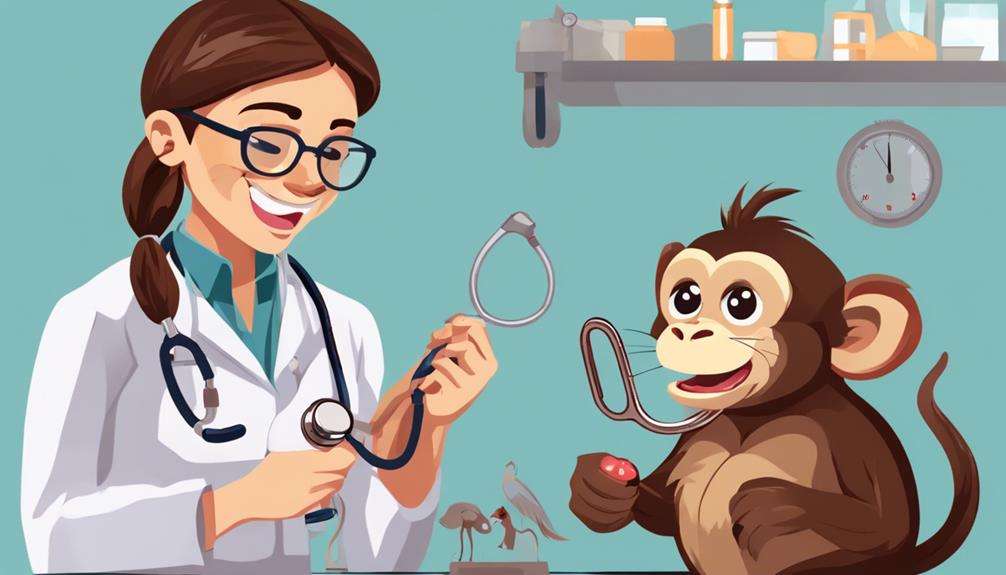
Regular veterinary check-ups are essential for monitoring the health status of your pet monkey. These check-ups allow the vet to assess your monkey's overall well-being, detect any potential health issues early on, and provide necessary vaccinations.
Monitoring your monkey's weight, appetite, and behavior is important in identifying changes that could indicate an underlying problem. Vaccinations recommended by your vet are important for preventing common diseases in pet monkeys.
Should you notice any signs of illness or distress, seek immediate veterinary care to address the issue promptly. It's important to stay informed about the common health issues that monkeys face to be proactive in their care and treatment.
Socialization and Bonding Activities
To foster a strong bond with your pet monkey, engaging in regular playtime is essential. Interactive toys can provide mental stimulation and entertainment, enhancing the quality of your monkey's social interactions.
Playtime for Bonding
Engage your pet monkey in stimulating playtime activities to foster a strong bond and enhance socialization skills. Regular playtime sessions are important for bonding with your monkey.
Utilize interactive games and toys to promote socialization and mental stimulation. Incorporate positive reinforcement techniques during playtime to reinforce good behavior and strengthen the bond between you and your pet.
Spend quality time interacting with your monkey to build trust and companionship. Monitor your monkey's behavior during playtime to make sure a positive and enriching experience.
Interactive Toys Essential
Interactive toys play an important role in providing mental stimulation and preventing boredom in pet monkeys. These toys not only entertain but also encourage natural behaviors, keeping your monkey engaged and mentally active. By engaging in play with interactive toys, you aren't only providing entertainment but also strengthening the bond between you and your pet.
The interactive nature of these toys allows for shared experiences, enhancing your relationship with your monkey. Additionally, proper toys can help alleviate stress and anxiety in pet monkeys, promoting their overall well-being. To guarantee continued engagement, offer a variety of toys and rotate them regularly to keep the playtime fresh and exciting for your furry companion.
Monkey Human Interaction
When focusing on Monkey Human Interaction for socialization and bonding activities, it's imperative to prioritize fostering a sense of companionship and emotional connection between the pet monkey and its human caregivers.
Socialization plays an important role in a pet monkey's mental well-being, so make sure they interact with other monkeys or pets in a safe environment. Monitoring these social interactions is essential to prevent conflicts and maintain a positive atmosphere.
Engaging in playtime activities is necessary for building relationships and strengthening the bond between you and your pet monkey. Consider seeking professional training to enhance your pet monkey's social skills, promoting positive interactions and overall well-being.
Training Techniques and Behavior Management
How can positive reinforcement techniques benefit the training and behavior management of pet monkeys?
Positive reinforcement techniques are important for training pet monkeys effectively and promoting desired behaviors. By rewarding good behavior with treats, praise, or other incentives, you can encourage monkeys to repeat these actions. Consistent training sessions are essential as they not only reinforce learning but also provide mental stimulation that prevents boredom and potential behavior issues.
Socialization plays a crucial role in a monkey's behavior development. It's important to expose them to various environments, people, and other monkeys to make sure they learn appropriate social behaviors. Understanding your monkey's body language and vocalizations is key to effective communication and training. By paying attention to their cues, you can better address their needs and preferences.
For successful behavior management, seek guidance from experienced trainers or behavior specialists. They can provide valuable insights and techniques to address any behavioral issues that may arise. Remember, patience, consistency, and positive reinforcement are the cornerstones of effective training and behavior management for pet monkeys.
Legal Considerations for Pet Monkeys
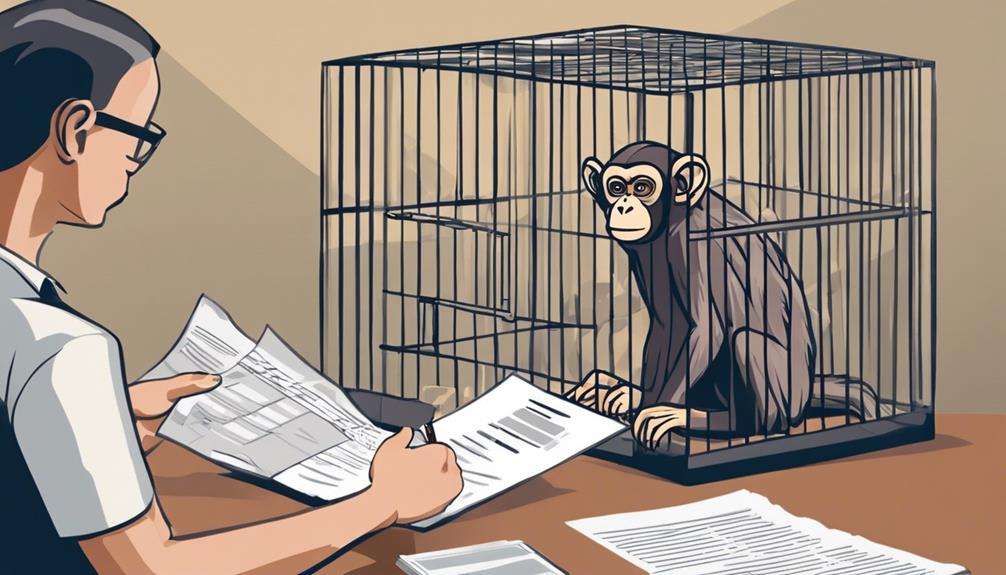
To properly care for a pet monkey, it's imperative to understand the legal considerations surrounding their ownership and maintenance. The legality of keeping a pet monkey varies greatly depending on your location. In the US, some states have outright bans on owning monkeys due to legal restrictions aimed at protecting both the animals and the public.
Importing a monkey into the US is prohibited under federal law to prevent the spread of diseases and protect native wildlife. It's important for potential monkey owners to thoroughly research and comply with local laws and regulations concerning pet monkeys.
Moving with a pet monkey can be complicated as legal restrictions on ownership may differ from one place to another. Owners may also be required to obtain permits and undergo home inspections to make sure they're providing proper care and following all regulations.
Before considering a pet monkey, always consult with local authorities to understand the legal landscape surrounding monkey ownership in your area.
Common Challenges in Monkey Care
Ensuring proper socialization and enrichment is key to addressing common challenges in the care of pet monkeys. Behavioral issues like aggression and stress can arise when monkeys aren't adequately socialized and provided with mental stimulation.
Health concerns such as diabetes and obesity are prevalent among pet monkeys due to inappropriate diets and lack of exercise. These health issues can importantly impact the well-being of the monkeys, requiring vigilant monitoring and specialized care. Additionally, legal restrictions and regulations surrounding pet monkeys can pose additional challenges for owners, varying in stringency depending on the location.
To mitigate these challenges, it's essential to prioritize the social needs of pet monkeys, create a stimulating environment, and adhere to proper dietary and exercise routines. Seeking out veterinary care from professionals experienced in primate health is crucial for addressing any health concerns promptly.
Frequently Asked Questions
How Do You Take Care of a Pet Monkey?
To care for a pet monkey, provide enrichment activities and socialization. Meet dietary needs and offer training. Establish an exercise routine, understand behavioral cues. Guarantee health checkups and use proper grooming techniques. Your commitment is crucial for their well-being.
What Special Care Does a Monkey Need?
To guarantee your pet monkey thrives, concentrate on enrichment activities and nutritional needs. Prioritize socialization and exercise routines. Attend to grooming requirements and regular veterinary visits. Strengthen your bond through proper training methods and bonding techniques.
How High Maintenance Is a Pet Monkey?
Keeping a pet monkey can be incredibly demanding. They require constant attention, mental stimulation, and proper care. Behavioral training, enrichment activities, socialization needs, and dietary requirements are essential for their well-being.
How Often Do You Bathe a Monkey?
When bathing a monkey, use lukewarm water and mild shampoo as needed, typically once a month. Assure comfort to prevent stress. Monkeys might like self-bathing for enrichment. Regular grooming maintains hygiene. Enjoy the bonding time!
Conclusion
In summary, when caring for a pet monkey, it's important to remember that these intelligent animals require specialized care and attention to thrive.
Did you know that over 90% of behavioral issues in pet monkeys can be prevented through proper socialization and enrichment activities?
By following best practices in monkey care, you can guarantee a happy and healthy life for your furry friend.
Remember, responsible ownership is key to a fulfilling relationship with your primate companion.
